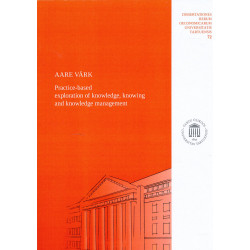



Tartu : University of Tartu Press, 2021
ISBN: 9789949036844
127 p. ; 25 cm
Dissertationes rerum oeconomicarum Universitatis Tartuensis, 1406-1309 ; 72
Softcover new book
Doctoral theses defended at the University of Tartu, summary in Estonian
Is the knowledge that people use in their everyday work personal or collective? To know something is a familiar feeling to everyone. However, without the opportunity to learn from others, we would know very little. Knowledge emerges through personal experience, but is legitimised through collective approval. The thesis asks how do the personal and collective dimensions of knowledge interact and how is it affected by various knowledge management practices – activities aimed at creating, sharing and reusing knowledge. Knowledge management can be pursued on the organisational level through formal work processes aimed at supporting organisational development. Knowledge can also be managed personally, beyond the role of an employee, with persons’ own means and resources to support personal development and career. Do these two sides support or compete with each other? Turns out, that both. Knowledge, that people use in organisations, is often acquired personally, with the aim to support one’s own professional development. Managing knowledge personally does not mean that people would not be willing to share and use it in organisation. However, it was found that when formal and personal knowledge management practices had similar functions, people preferred personal practices to organisational ones. For example, instead of storing articles on a company server, people preferred their own cloud accounts. The world of professional work is becoming more diverse and individualist. Because of this, it is necessary to better understand how are individual and collective knowledge interconnected. Current thesis contributes to this aim.